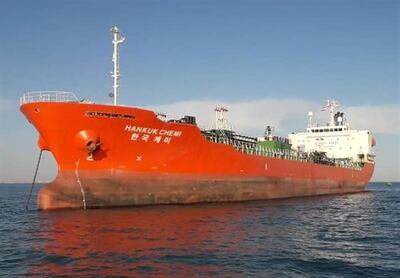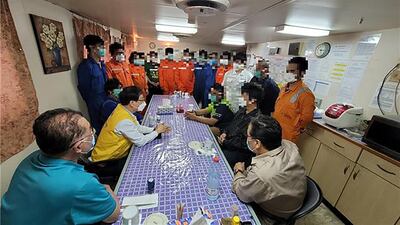Iran’s decision this week to release the crew members of a South Korean ship, the Hankuk Chemi, seized in the Strait of Hormuz last month demonstrates that the entire enterprise was nothing more than an exercise in the ancient art of hostage-taking.
The Iranian authorities insist that the release of the 19 crew was undertaken on entirely “humanitarian” grounds. But the fact that their decision coincided with an undertaking by Seoul to work for the release of $7 billion of Iranian funds frozen in South Korea tells a very different story.
Ever since the 1979 Iranian revolution, the regime has frequently resorted to hostage-taking in an attempt to achieve various policy goals, from the US embassy siege in Tehran, which was undertaken to put pressure on Washington to hand over Iran’s recently deposed Shah, to the Western hostage crisis in Lebanon in the 1980s, which we now know was orchestrated to persuade the US to provide Tehran with much-needed weaponry for its campaign against Iraqi dictator Saddam Hussein during the Iran-Iraq war.
Four decades may have passed since those events, but judging by its recent seizures of several foreign and dual citizens, the regime has lost none of its enthusiasm for taking hostages when it suits its broader policy objectives.
And, as the case of the South Korean tanker by Iran’s Islamic Revolutionary Guard Corps demonstrates, the most likely motive is usually related to Tehran’s desperate need to avoid the crippling effects of US sanctions.
Iranian forces seized the tanker during the dying days of the administration of former US president Donald Trump on January 4 as it passed through the Strait of Hormuz, accusing it of “causing environmental pollution”.
The ship was escorted to the port of Bandar Abbas, where its 20-strong crew, including nationals of South Korea, Indonesia, Vietnam and Myanmar, were detained.

Now, following weeks of intense negotiations between South Korean diplomats and Tehran, Iran has announced it is allowing all the ship’s crew members – with the exception of the captain – to leave the country. Announcing the decision, Iran’s Foreign Ministry spokesman, Saeed Khatibzadeh, told state media that the ship’s crew “had received permission to leave the country in a humanitarian move by Iran”.
South Korean officials insist no chemicals were spilled by the ship nor were any rules breached, and claimed the ship had been approached by speed boats operated by the IRGC while sailing in international waters.
It is no coincidence that Iran, which has a history of seizing ships bearing the flags of nations it has disputes with, has long been furious that South Korea had refused to release an estimated $7bn of Iranian oil-export revenue that it says it needs to purchase anti-coronavirus medicines, including possible vaccines. The money had been withheld because of American sanctions on Iranian oil.
Apparently serendipitously, South Korea simultaneously pledged to speed up the unfreezing of the $7bn in a bid to “restore trust”.
At the end of last year, it emerged that Iran had released a British-Australian scholar, Kylie Moore-Gilbert, detained since 2018 on charges of spying for Israel, in a prisoner swap for three convicted Iranian terrorists. Ms Moore-Gilbert, a lecturer in Islamic Studies at the University of Melbourne, was arrested by IRGC agents after she travelled to Iran in 2018 to attend a conference. She was handed a 10-year sentence, much of it served in Iran’s notorious Evin Prison, where she staged several hunger strikes and claimed her mental state was deteriorating because of prolonged spells of solitary confinement. She was eventually released in late November as part of an agreement in which Thailand freed three Iranian terrorists convicted of a failed plot to assassinate Israeli diplomats in Bangkok in 2012.
The case of Nazanin Zaghari-Ratcliffe, a British-Iranian mother who has been jailed for five years in Iran on similarly trumped-up spying charges, is another high profile example of this institutionalised kidnap-for-ransom strategy to resolve long-standing disputes.
In the case of Ms Zaghari-Ratcliffe, who is due to complete her term and be released next month, her imprisonment is said to relate to a long-standing £400 million debt that Iran says is owed by Britain relating to the non-delivery of tanks ordered by the Shah in 1979. Ms Zaghari-Ratcliffe’s husband Richard, who has run a high-profile campaign for her release in Britain, has accused Tehran of indulging in “state hostage-taking” in relation to his wife’s ordeal.
Not all of Iran’s attempts to hold foreign nationals captive are successful. Earlier this week, it was revealed that a British-Iranian academic facing nine years in jail on spying charges is now safe in the UK. Kameel Ahmady, a British-Iranian academic conducting research on child marriage and female genital mutilation in Iran, was convicted two months ago of collaborating with a hostile government after the IRGC claimed that a charity he once worked for had received funding from the US.
Mr Ahmady was lucky that after three months of interrogation by Iranian security officials, he was released on bail prior to his trial. But after he was convicted in December and given a nine-year jail term, he decided to escape, travelling over the mountains on foot before eventually making his way to Britain. As a result, unlike the other unfortunate victims of Iran’s policy of state-sponsored hostage-taking, Mr Ahmady is once again a free man. The empty cell that awaited him, however, will surely be filled by another.
Con Coughlin is a defence and foreign affairs columnist for The National



